大学生英语第一册翻译
- 格式:doc
- 大小:59.50 KB
- 文档页数:10
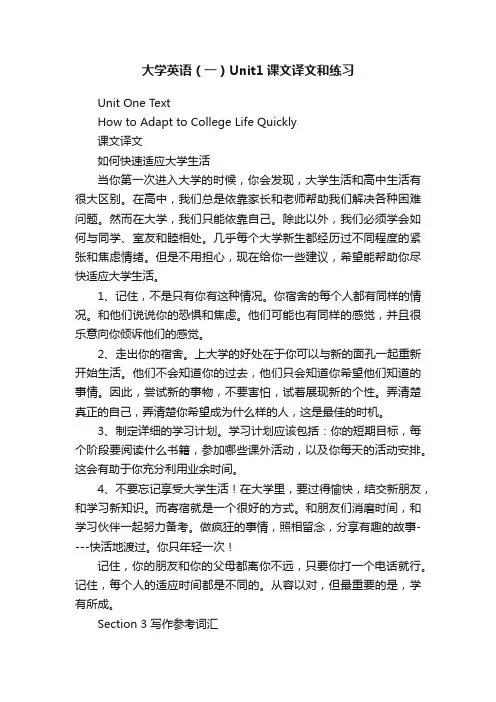
大学英语(一)Unit1课文译文和练习Unit One TextHow to Adapt to College Life Quickly课文译文如何快速适应大学生活当你第一次进入大学的时候,你会发现,大学生活和高中生活有很大区别。
在高中,我们总是依靠家长和老师帮助我们解决各种困难问题。
然而在大学,我们只能依靠自己。
除此以外,我们必须学会如何与同学、室友和睦相处。
几乎每个大学新生都经历过不同程度的紧张和焦虑情绪。
但是不用担心,现在给你一些建议,希望能帮助你尽快适应大学生活。
1、记住,不是只有你有这种情况。
你宿舍的每个人都有同样的情况。
和他们说说你的恐惧和焦虑。
他们可能也有同样的感觉,并且很乐意向你倾诉他们的感觉。
2、走出你的宿舍。
上大学的好处在于你可以与新的面孔一起重新开始生活。
他们不会知道你的过去,他们只会知道你希望他们知道的事情。
因此,尝试新的事物,不要害怕,试着展现新的个性。
弄清楚真正的自己,弄清楚你希望成为什么样的人,这是最佳的时机。
3、制定详细的学习计划。
学习计划应该包括:你的短期目标,每个阶段要阅读什么书籍,参加哪些课外活动,以及你每天的活动安排。
这会有助于你充分利用业余时间。
4、不要忘记享受大学生活!在大学里,要过得愉快,结交新朋友,和学习新知识。
而寄宿就是一个很好的方式。
和朋友们消磨时间,和学习伙伴一起努力备考。
做疯狂的事情,照相留念,分享有趣的故事----快活地渡过。
你只年轻一次!记住,你的朋友和你的父母都离你不远,只要你打一个电话就行。
记住,每个人的适应时间都是不同的。
从容以对,但最重要的是,学有所成。
Section 3 写作参考词汇faculty 学院department 系/部,institute 学院/研究院campus 校园,laboratory/lab 实验室auditorium 会堂/礼堂, gymnasium 体育馆/健身室information desk 咨询处library 图书馆art center 艺术中心clinic 医务室laundry room 洗衣室dining hall 食堂common room 公共休息室Administration Office 管理办公室computer center 计算机网络中心Student Accommodation Center 学生住宿管理中心audio-visual resource center 音像资料中心Law School 法学院Medical School 医学院Business School 商学院Faculty of EnglishLanguage and Culture英语语言文化学院Faculty of ElectronicEngineering电子工程学院Chemistry Department 化学系Faculty of Social Studies 社会学学院Mathematics Department 数学系Physics Department 物理系Physical Science Department自然科学系Management Institute管理学院Education Institute 教育学院Students’ Union学生会society社团registration form注册表membership application会员资格申请Recreation Center娱乐室Sports Hall 体育馆Activity Room 活动室playing fields 比赛场地tennis court 网球场football field 足球场volleyball 排球badminton 羽毛球racket 球拍Task 3 Give brief answers to the following questions. (p4)1. How do students solve all kinds of difficult problems at college?Students have to rely on themselves.2. How do most college freshmen feel when they first enter college?They experience some level of nervousness and anxiety.3. What does a detailed study plan usually include?It should include a student’s short-term goals, what books to read at a certain stage, what extra curriculum activities to participate in and daily activities.4. What is college about according to the passage?College is about having fun and making new friends as well as learning new knowledge.5. What could new students do when they are in need of help to adjust to the new environment?Just give a phone call to their friends and parents who are always ready to help.6. How do you adapt to your college life?OpenTask 6 Read the English sentences and translate the Chinesesentences into English.( P6)1. What's more, we should learn to live independently.What's more, we lack necessary experience.2. Chances are that man will eventually land on Mars.Chances are that Grace will not come to the meeting.3. For this reason, many of his former friends turned against him.For this reason, I have decided to take teaching as my future career.4. This is a great time not only to learn new knowledge but also to developourselves in all aspects.This is a great time not only to relax oneself but also to experience new things.5. Reading English aloud in the morning will do you a lot of good.Cheating in an exam ruins one's personality.Section 4 Activity 2 Task 1 (p14)1) This is my friend Mary. She is a student at Binhai Technical School.这是我们的新老师史密斯先生,他来自澳大利亚。
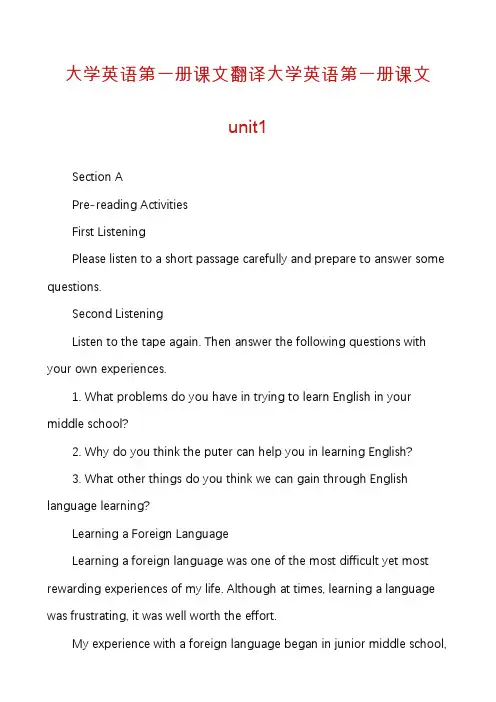
大学英语第一册课文翻译大学英语第一册课文unit1Section APre-reading ActivitiesFirst ListeningPlease listen to a short passage carefully and prepare to answer some questions.Second ListeningListen to the tape again. Then answer the following questions with your own experiences.1. What problems do you have in trying to learn English in your middle school?2. Why do you think the puter can help you in learning English?3. What other things do you think we can gain through English language learning?Learning a Foreign LanguageLearning a foreign language was one of the most difficult yet most rewarding experiences of my life. Although at times, learning a language was frustrating, it was well worth the effort.My experience with a foreign language began in junior middle school,when I took my first English class. I had a kind and patient teacher who often praised all of the students. Because of this positive method, I eagerly answered all the questions I could, never worrying much about making mistakes. I was at the top of my class for two years.When I went to senior middle school, I was eager to continue studying English; however, my experience in senior school was very different from before. While my former teacher had been patient with all the students, my new teacher quickly punished those who gave incorrect answers. Whenever we answered incorrectly, she pointed a long stick at us and, shaki ng it up and down, shouted, “No! No! No!" It didn't take me long to lose my eagerness to answer questions. Not only did I lose my joy in answering questions, but also I totally lost my desire to say anything at all in English.However, that state didn't last long. When I went to college, I learned that all students were required to take an English course. Unlike my senior middle school teacher, my college English teachers were patient and kind, and none of them carried long, pointed sticks! However, the situation was far from perfect. As our classes were very large, I was only able to answer a couple of questions in each class period. Also, after a few weeks of classes, I noticed there were many students who spoke much better than I did. I began to feel intimidated. So, once again, although for different reasons, I was afraid to speak. It seemed my English was going to stay at the samelevel forever.That was the situation until a couple of years later, when I was offered an opportunity to study English through an online course. The munication medium was a puter, phone line, and modem. I soon got access to the necessary equipment, learned the technology from a friend and participated in the virtual classroom 5 to 7 days a week.Online learning is not easier than regular classroom study; it requires much time, mitment and discipline to keep up with the flow of the course.I worked hard to meet the minimum standards set by the course and to plete assignments on time.I practiced all the time. I carried a little dictionary with me everywhere I went, as well as a notebook in which I listed any new words I heard. I made many, sometimes embarrassing, mistakes. Once in a while I cried with frustration, and sometimes I felt like giving up. But I didn't feel intimidated by students who spoke faster than I did because I took all the time I needed to think out my ideas and wrote a reply before posting it on the screen. Then, one day I realized I could understand just about everything I came across, and most importantly, I could "say" anything I wanted to in English. Although I still made many mistakes and was continually learning, I had finally reaped the benefits of all that hard work.Learning a foreign language has been a most trying experience for me, but one that I wouldn't trade for anything. Not only did learninganother language teach me the value of hard work, but it also gave me insights into another culture, and my mind was opened to new ways of seeing things. The most wonderful result of having learned a foreign language was that I could municate with many more people than before. Talking with people is one of my favorite activities, so being able to speak a new language lets me meet new people, participate in conversations, and form new, unforgettable friendships. Now that I speak a foreign language, instead of staring into space when English is being spoken, I can participate and make friends. I am able to reach out to others and bridge the gap between my language and culture and theirs.Section BKeys to Successful Online LearningWhile regular schools still exist, the virtual classroom plays an important role in today's learning munity. Job opportunities for students are expanding rapidly and more people of all ages are ing aware of online learning that allows them to study at home. Online students, however, require unique qualities to be successful. The following list discusses some ideal qualities of successful online students.1. Be open-minded about sharing life, work, and learning experiences as part of online learning.Many different people find that the online method requires them to use their experiences and that online learning offers them a place tomunicate with each other. This forum for munication removes the visual barriers that hinder some students from expressing themselves. In addition, students are given time to reflect on the information before replying. In this way, students can help to keep the online environment open and friendly.2. Be able to municate through writing.In the virtual classroom nearly all munication is written, so it is critical that students feel fortable expressing themselves in writing. Some students have limited writing abilities which need to be improved before or as part of the online experience. This usually requires extra mitment by these students. Whether working alone or in a group, students share ideas, perspectives and discussions on the subject being studied, and read about those of their classmates. In this way, students gain great insight from their peers, learning from each other as well as the instructor.3. Be willing to "speak up" if problems arise.Remember that instructors cannot see their students in an online course. This means students must be absolutely explicit with their ments and requests. If they experience technical difficulties, or problems in understanding something about the course, they MUST speak up; otherwise there is no way anyone can know something is wrong. If one person does not understand something, possibly several others have the same problem. If another student is able to help, she/he probably will.While explaining something to others, students reinforce their own knowledge about the subject.4. Take the program seriously.Online learning is not easier than study in regular classrooms. In fact, many students say it requires much more time and effort. Requirements for online courses are not less than those of any quality program. Successful students, however, see online learning as a convenient way to receive their education — not an easier way. Many online students sit at puters for hours at a time during evenings and on weekends in order to plete their assignments. When other people are finished and having fun is most likely the time when online students do their course work. Online students need to mit 4 to 15 hours a week for each course.5. Accept critical thinking and decision making as part of online learning.Online courses require students to make decisions based on facts as well as experience. It is absolutely necessary for students to assimilate information and make the right decisions based on critical thinking. In a positive online environment, students feel valued by the instructor, by their classmates and by their own work.6. Be able to think ideas through before replying.Providing meaningful and quality input into the virtual classroom is an essential part of online learning. Time is given to allow for carefuldevelopment of answers. Testing and challenging of ideas is encouraged. Many times online students will not always be right; they just need to be prepared to accept a challenge.7. Keep up with the progress of the course.Online learning is normally sequential and requires mitment on the students' part. Keeping up with the face-to-face class and pleting all work on time is vital. Once students get behind, it is almost impossible to catch up. Students need to want to be there and need to want the experience. The instructor may have to municate with students personally to offer help and remind them of the need to keep up.Just as many excellent instructors may not be effective online facilitators, not all students have the necessary qualities to perform well online. People who have the qualities discussed above usually make very successful online students. If you have these qualities, learning online may be one of the best discoveries you will ever make.Section CTeaching Children at HomeRecord numbers of children are being taken out of school and taught by their parents at home. Up to 100 children a month are leaving the classroom because parents are not satisfied with schools. Around 15,000 families now teach their children at home, a rise of 50 per cent from last year, according to the latest figures.This present rise in home schooling is blamed on the nature of examinations, not getting children into the school of choice, and dissatisfaction with teaching methods. Some parents prefer keeping children home because of attacks by other students and a lack of discipline in schools. Researchers say, however, many families prefer teaching at home because they feel the idea of public schooling is not modern. They believe schools will be things of the past in 20 years as media technology, like the Internet, teaches children. 1. ______Under the law, parents must teach their children, whether at school or at home. Community officials are charged with protecting their schooling. Professor Meighan of Nottingham University says parents were fed up with the requirements of existing schools. For him, schools are an out-of-date concept from the days of the town crier(市政传令员), when it was difficult to get information and a central person was needed to municate knowledge. He also thinks parents are recognizing education is moving on and don't want their children to be held back by out-of-date methods. 2. ______Meighan suggests children will be taught at home using the Internet, puters, and video(录像片). He thinks future schools will be small groups of children, sharing equipment in their homes. The teachers may e advisers who sort through the information. 3. ______Future schooling was questioned by Sir Christopher Ball of the Royal(皇家的)Society of Arts. He thinks learning in the future will include an international curriculum and international standards. He sees some present models of schooling — munity schools and home schooling, for example — ing more central and other models, not yet existing, may develop. 4.______How Personal Choice Brings O-Level Success at 13Leslie Barson is already running the type of school that researchers think will teach children in the future. Based partly at a munity centre and partly in family homes, the Otherwise Club includes some 35 families around north London. Professional teachers are brought in to help with special subjects, but mostly parents and children work together on units like studying the Greeks or the American Civil War, reading about events, making costumes(戏装), and learning how people used to live. 5.______ 6. ______Parents choosing home schooling say the freedom of home learning allows some children to sit one or two GCEs by the age of 13. Ms. Barson's own children, Luis, age 12, and 7-year-old Lilly, have never attended school. She pays around 2,000 pounds a year for private teachers to help in special areas. She set up the Otherwise Club six years ago with just a few students. She thinks the purpose of teaching children is to develop their self-worth. Her son agrees. Luis, now teaching himself math, said, "I like the freedom to learn things that interest me, especially music. I don't feel Iam missing out on anything by not being at school because I am a member of various clubs and have friends who attend normal school." 7. ______ 8. ______The “Danger” of Separating StudentsHome schooling could change children's relations with their peers and older people because of long periods spent with their parents. Most professors agree future learning will be more centred around the home, and fear children could e isolated and shy. Professor Michael Barber of London University said pupils could spend half their time at school, half at home as a way to solve this problem. He believes very strongly that children need the experience of school to ensure the quality of being taught the basics and being examined. He thinks children must spend time with peers to learn the rules of work in a democratic(民主的)society and to learn how to deal with relations with more people than just their parents. Margaret Rudland, head teacher in Hammersmith, also thinks children must experience actual peer relations. 9. ______ 10. ______。
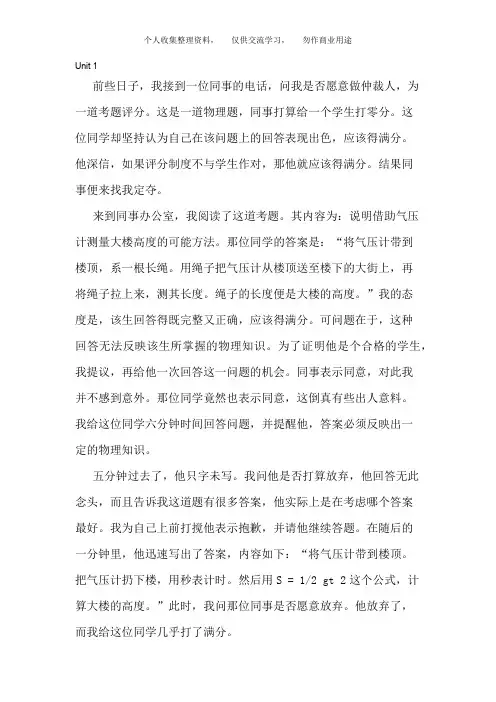
Unit 1前些日子,我接到一位同事的电话,问我是否愿意做仲裁人,为一道考题评分。
这是一道物理题,同事打算给一个学生打零分。
这位同学却坚持认为自己在该问题上的回答表现出色,应该得满分。
他深信,如果评分制度不与学生作对,那他就应该得满分。
结果同事便来找我定夺。
来到同事办公室,我阅读了这道考题。
其内容为:说明借助气压计测量大楼高度的可能方法。
那位同学的答案是:“将气压计带到楼顶,系一根长绳。
用绳子把气压计从楼顶送至楼下的大街上,再将绳子拉上来,测其长度。
绳子的长度便是大楼的高度。
”我的态度是,该生回答得既完整又正确,应该得满分。
可问题在于,这种回答无法反映该生所掌握的物理知识。
为了证明他是个合格的学生,我提议,再给他一次回答这一问题的机会。
同事表示同意,对此我并不感到意外。
那位同学竟然也表示同意,这倒真有些出人意料。
我给这位同学六分钟时间回答问题,并提醒他,答案必须反映出一定的物理知识。
五分钟过去了,他只字未写。
我问他是否打算放弃,他回答无此念头,而且告诉我这道题有很多答案,他实际上是在考虑哪个答案最好。
我为自己上前打搅他表示抱歉,并请他继续答题。
在随后的一分钟里,他迅速写出了答案,内容如下:“将气压计带到楼顶。
把气压计扔下楼,用秒表计时。
然后用S = 1/2 gt 2这个公式,计算大楼的高度。
”此时,我问那位同事是否愿意放弃。
他放弃了,而我给这位同学几乎打了满分。
离开同事办公室时,我想起那位同学说过他还有其他解答方法,便问他还有哪些方法。
他答道:“是呀,有很多种借助气压计测量大楼高度的方法。
比如说,你可以在阳光明媚的时候把气压计带出去,先测量气压计的高度及其影子的长度,再测出大楼影子的长度,然后利用单比例关系,就能计算出大楼的高度。
”“真不错,”我说道,“还有其他方法吗?”“有啊,”他说,“有一种最基本的测量方法,你一定会喜欢。
这种方法需要你带着气压计去爬楼梯,一边上楼,一边沿着墙壁按气压计的高度做记号,然后数数做了多少个记号,就知道大楼的高度是多少个气压计的单位高度了。
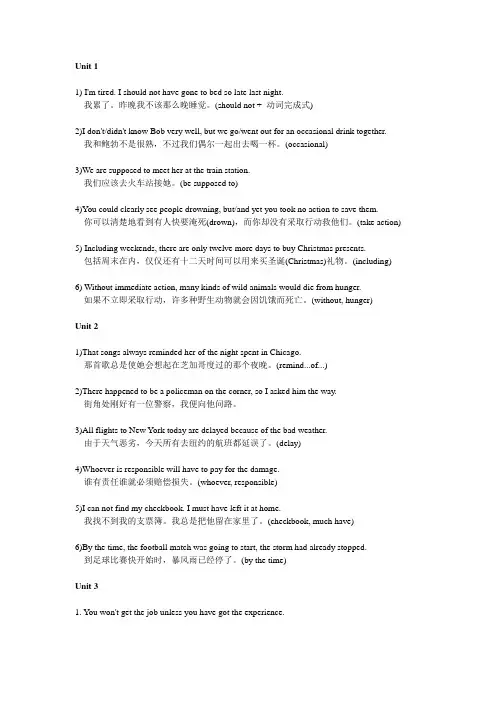
Unit 11) I'm tired. I should not have gone to bed so late last night.我累了。
昨晚我不该那么晚睡觉。
(should not + 动词完成式)2)I don't/didn't know Bob very well, but we go/went out for an occasional drink together.我和鲍勃不是很熟,不过我们偶尔一起出去喝一杯。
(occasional)3)We are supposed to meet her at the train station.我们应该去火车站接她。
(be supposed to)4)You could clearly see people drowning, but/and yet you took no action to save them.你可以清楚地看到有人快要淹死(drown),而你却没有采取行动救他们。
(take action)5) Including weekends, there are only twelve more days to buy Christmas presents.包括周末在内,仅仅还有十二天时间可以用来买圣诞(Christmas)礼物。
(including)6) Without immediate action, many kinds of wild animals would die from hunger.如果不立即采取行动,许多种野生动物就会因饥饿而死亡。
(without, hunger)Unit 21)That songs always reminded her of the night spent in Chicago.那首歌总是使她会想起在芝加哥度过的那个夜晚。
(remind...of...)2)There happened to be a policeman on the corner, so I asked him the way.街角处刚好有一位警察,我便向他问路。
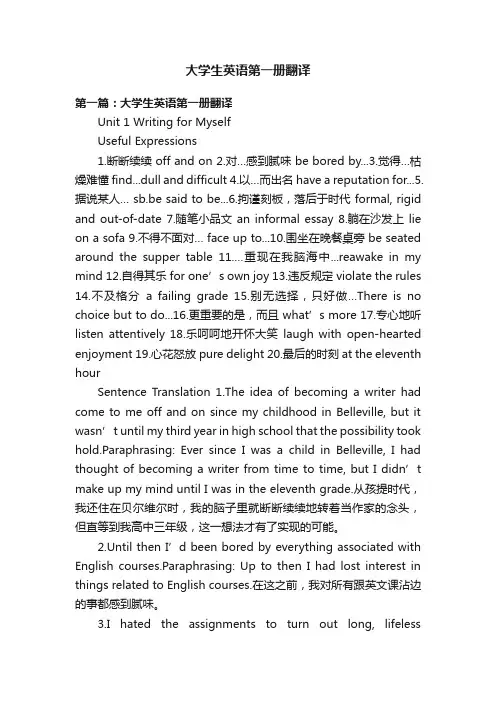
大学生英语第一册翻译第一篇:大学生英语第一册翻译Unit 1 Writing for MyselfUseful Expressions1.断断续续 off and on2.对…感到腻味 be bored by...3.觉得…枯燥难懂 find...dull and difficult4.以…而出名have a reputation for...5.据说某人… sb.be said to be...6.拘谨刻板,落后于时代 formal, rigid and out-of-date7.随笔小品文an informal essay8.躺在沙发上lie on a sofa9.不得不面对… face up to...10.围坐在晚餐桌旁 be seated around the supper table 11.…重现在我脑海中...reawake in my mind 12.自得其乐for one’s own joy 13.违反规定 violate the rules 14.不及格分a failing grade 15.别无选择,只好做…There is no choice but to do...16.更重要的是,而且what’s more 17.专心地听listen attentively 18.乐呵呵地开怀大笑laugh with open-hearted enjoyment 19.心花怒放pure delight 20.最后的时刻 at the eleventh hourSentence Translation 1.The idea of becoming a writer had come to me off and on since my childhood in Belleville, but it wasn’t until my third year in high school that the possibility took hold.Paraphrasing: Ever since I was a child in Belleville, I had thought of becoming a writer from time to time, but I didn’t make up my mind until I was in the eleventh grade.从孩提时代,我还住在贝尔维尔时,我的脑子里就断断续续地转着当作家的念头,但直等到我高中三年级,这一想法才有了实现的可能。
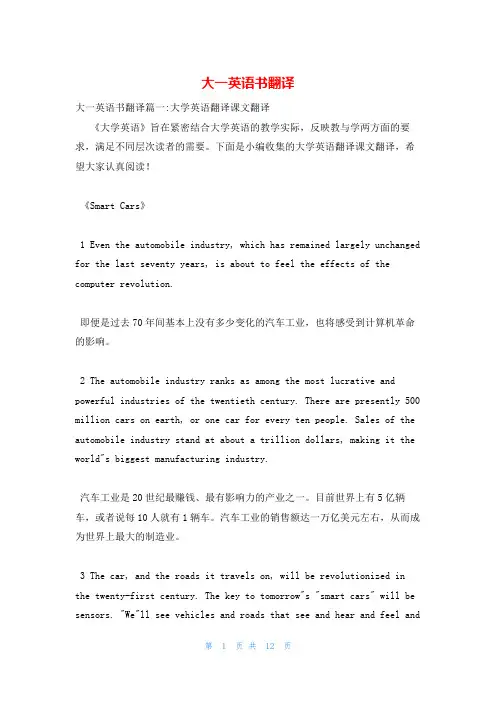
大一英语书翻译大一英语书翻译篇一:大学英语翻译课文翻译《大学英语》旨在紧密结合大学英语的教学实际,反映教与学两方面的要求,满足不同层次读者的需要。
下面是小编收集的大学英语翻译课文翻译,希望大家认真阅读!《Smart Cars》1 Even the automobile industry, which has remained largely unchanged for the last seventy years, is about to feel the effects of the computer revolution.即便是过去70年间基本上没有多少变化的汽车工业,也将感受到计算机革命的影响。
2 The automobile industry ranks as among the most lucrative and powerful industries of the twentieth century. There are presently 500 million cars on earth, or one car for every ten people. Sales of the automobile industry stand at about a trillion dollars, making it the world"s biggest manufacturing industry.汽车工业是20世纪最赚钱、最有影响力的产业之一。
目前世界上有5亿辆车,或者说每10人就有1辆车。
汽车工业的销售额达一万亿美元左右,从而成为世界上最大的制造业。
3 The car, and the roads it travels on, will be revolutionized in the twenty-first century. The key to tomorrow"s "smart cars" will be sensors. "We"ll see vehicles and roads that see and hear and feel andsmell and talk and act," predicts Bill Spreitzer, technical director of General Motors Corporation"s ITS program, which is designing the smart car and road of the future.汽车及其行驶的道路,将在21世纪发生重大变革。
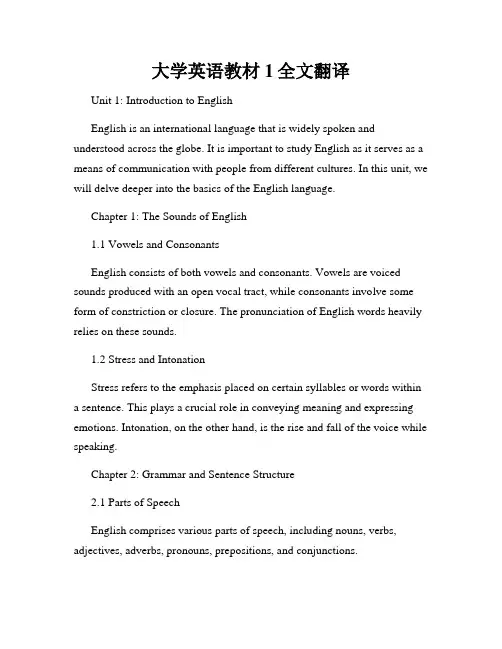
大学英语教材1全文翻译Unit 1: Introduction to EnglishEnglish is an international language that is widely spoken and understood across the globe. It is important to study English as it serves as a means of communication with people from different cultures. In this unit, we will delve deeper into the basics of the English language.Chapter 1: The Sounds of English1.1 Vowels and ConsonantsEnglish consists of both vowels and consonants. Vowels are voiced sounds produced with an open vocal tract, while consonants involve some form of constriction or closure. The pronunciation of English words heavily relies on these sounds.1.2 Stress and IntonationStress refers to the emphasis placed on certain syllables or words within a sentence. This plays a crucial role in conveying meaning and expressing emotions. Intonation, on the other hand, is the rise and fall of the voice while speaking.Chapter 2: Grammar and Sentence Structure2.1 Parts of SpeechEnglish comprises various parts of speech, including nouns, verbs, adjectives, adverbs, pronouns, prepositions, and conjunctions.Understanding their roles in a sentence is essential for constructing grammatically correct sentences.2.2 Sentence TypesEnglish sentences can be categorized into four types: declarative, interrogative, imperative, and exclamatory. Each type conveys a different mood or purpose. Through exercises and activities, students will learn howto form and identify these sentence types.Chapter 3: Vocabulary and Word Usage3.1 Word FormationEnglish words can be formed through various processes such as affixation, conversion, compound formation, and blending. This chapter explores the different strategies for building vocabulary.3.2 Collocations and Idiomatic ExpressionsCollocations are combinations of words that are frequently used together, while idiomatic expressions are phrases with figurative meanings that cannot be inferred from individual words. Learning collocations and idioms enhances students' language proficiency and fluency.Unit 2: Reading and ComprehensionChapter 1: Reading StrategiesThis chapter introduces effective reading strategies such as skimming, scanning, and predicting. These skills enable students to extract important information quickly and comprehend texts more efficiently.Chapter 2: Context CluesContext clues are words or phrases surrounding an unfamiliar word that provide hints for its meaning. Understanding how to use context clues empowers students to infer the meaning of unknown words while reading.Chapter 3: Reading Comprehension SkillsDeveloping reading comprehension skills is essential for understanding texts at various levels of complexity. Students will learn techniques such as summarizing, synthesizing, and evaluating information.Unit 3: WritingChapter 1: The Writing ProcessWriting involves a series of steps, including prewriting, drafting, revising, editing, and publishing. This chapter guides students through each stage, providing tips on generating ideas, organizing content, and polishing their final drafts.Chapter 2: Paragraph StructureA well-structured paragraph consists of a clear topic sentence, supporting sentences, and a concluding sentence. This chapter teaches students how to construct coherent and cohesive paragraphs.Chapter 3: Essay WritingFrom persuasive essays to descriptive essays, this chapter covers various essay types and provides guidelines on writing effective introductions, body paragraphs, and conclusions. Students will also learn how to incorporate evidence and develop their arguments.以上是大学英语教材1的全文翻译,希望对您有所帮助。
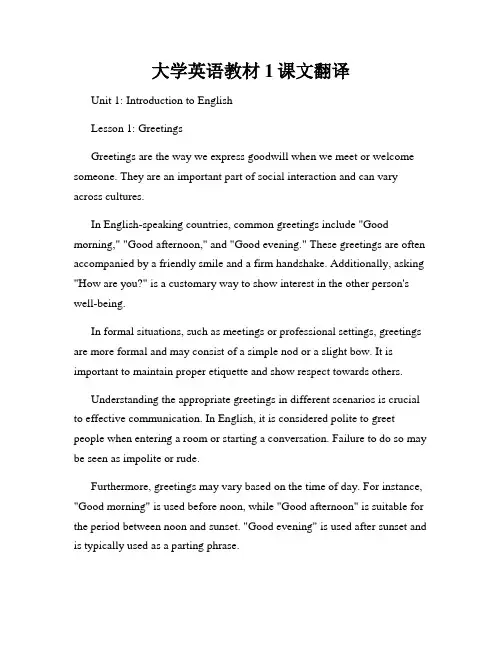
大学英语教材1课文翻译Unit 1: Introduction to EnglishLesson 1: GreetingsGreetings are the way we express goodwill when we meet or welcome someone. They are an important part of social interaction and can vary across cultures.In English-speaking countries, common greetings include "Good morning," "Good afternoon," and "Good evening." These greetings are often accompanied by a friendly smile and a firm handshake. Additionally, asking "How are you?" is a customary way to show interest in the other person's well-being.In formal situations, such as meetings or professional settings, greetings are more formal and may consist of a simple nod or a slight bow. It is important to maintain proper etiquette and show respect towards others.Understanding the appropriate greetings in different scenarios is crucial to effective communication. In English, it is considered polite to greet people when entering a room or starting a conversation. Failure to do so may be seen as impolite or rude.Furthermore, greetings may vary based on the time of day. For instance, "Good morning" is used before noon, while "Good afternoon" is suitable for the period between noon and sunset. "Good evening" is used after sunset and is typically used as a parting phrase.Learning greetings is one of the first steps in mastering a language. It not only helps you initiate conversations but also portrays your interest in others. By understanding and using appropriate greetings, you can create a positive impression and build rapport with people from different backgrounds.In conclusion, greetings play a significant role in social interactions and communication. They reflect cultural norms and contribute to establishing connections. Regardless of the language, greetings serve as a bridge between individuals, fostering mutual understanding and respect.。
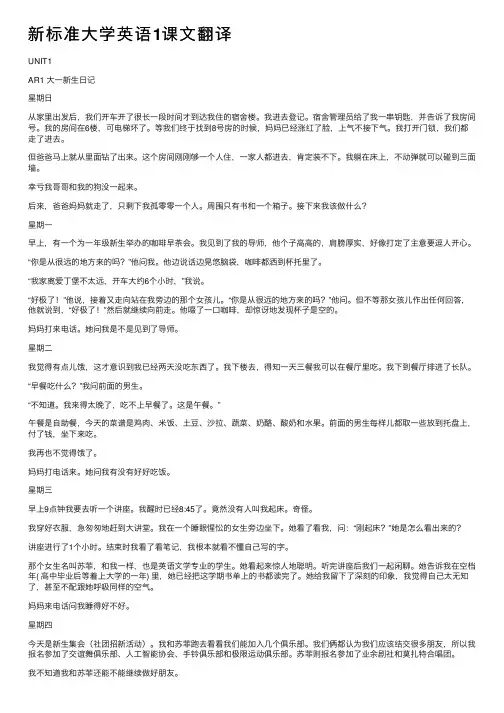
新标准⼤学英语1课⽂翻译UNIT1AR1 ⼤⼀新⽣⽇记星期⽇从家⾥出发后,我们开车开了很长⼀段时间才到达我住的宿舍楼。
我进去登记。
宿舍管理员给了我⼀串钥匙,并告诉了我房间号。
我的房间在6楼,可电梯坏了。
等我们终于找到8号房的时候,妈妈已经涨红了脸,上⽓不接下⽓。
我打开门锁,我们都⾛了进去。
但爸爸马上就从⾥⾯钻了出来。
这个房间刚刚够⼀个⼈住,⼀家⼈都进去,肯定装不下。
我躺在床上,不动弹就可以碰到三⾯墙。
幸亏我哥哥和我的狗没⼀起来。
后来,爸爸妈妈就⾛了,只剩下我孤零零⼀个⼈。
周围只有书和⼀个箱⼦。
接下来我该做什么?星期⼀早上,有⼀个为⼀年级新⽣举办的咖啡早茶会。
我见到了我的导师,他个⼦⾼⾼的,肩膀厚实,好像打定了主意要逗⼈开⼼。
“你是从很远的地⽅来的吗?”他问我。
他边说话边晃悠脑袋,咖啡都洒到杯托⾥了。
“我家离爱丁堡不太远,开车⼤约6个⼩时,”我说。
“好极了!”他说,接着⼜⾛向站在我旁边的那个⼥孩⼉。
“你是从很远的地⽅来的吗?”他问。
但不等那⼥孩⼉作出任何回答,他就说到,“好极了!”然后就继续向前⾛。
他啜了⼀⼝咖啡,却惊讶地发现杯⼦是空的。
妈妈打来电话。
她问我是不是见到了导师。
星期⼆我觉得有点⼉饿,这才意识到我已经两天没吃东西了。
我下楼去,得知⼀天三餐我可以在餐厅⾥吃。
我下到餐厅排进了长队。
“早餐吃什么?”我问前⾯的男⽣。
“不知道。
我来得太晚了,吃不上早餐了。
这是午餐。
”午餐是⾃助餐,今天的菜谱是鸡⾁、⽶饭、⼟⾖、沙拉、蔬菜、奶酪、酸奶和⽔果。
前⾯的男⽣每样⼉都取⼀些放到托盘上,付了钱,坐下来吃。
我再也不觉得饿了。
妈妈打电话来。
她问我有没有好好吃饭。
星期三早上9点钟我要去听⼀个讲座。
我醒时已经8:45了。
竟然没有⼈叫我起床。
奇怪。
我穿好⾐服,急匆匆地赶到⼤讲堂。
我在⼀个睡眼惺忪的⼥⽣旁边坐下。
她看了看我,问:“刚起床?”她是怎么看出来的?讲座进⾏了1个⼩时。
结束时我看了看笔记,我根本就看不懂⾃⼰写的字。
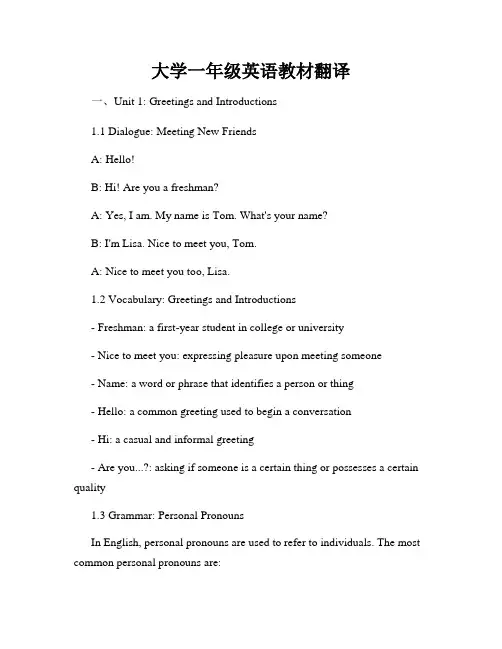
大学一年级英语教材翻译一、Unit 1: Greetings and Introductions1.1 Dialogue: Meeting New FriendsA: Hello!B: Hi! Are you a freshman?A: Yes, I am. My name is Tom. What's your name?B: I'm Lisa. Nice to meet you, Tom.A: Nice to meet you too, Lisa.1.2 Vocabulary: Greetings and Introductions- Freshman: a first-year student in college or university- Nice to meet you: expressing pleasure upon meeting someone- Name: a word or phrase that identifies a person or thing- Hello: a common greeting used to begin a conversation- Hi: a casual and informal greeting- Are you...?: asking if someone is a certain thing or possesses a certain quality1.3 Grammar: Personal PronounsIn English, personal pronouns are used to refer to individuals. The most common personal pronouns are:- I: used when referring to oneself as the subject of a sentence- You: used when referring to the person(s) being spoken to- He/She/It: used when referring to someone or something that is not the speaker or the person(s) being spoken to- We: used when referring to oneself and at least one other person as the subject of a sentence- They: used when referring to more than one person or thing as the subject of a sentence1.4 Exercise: Greetings and IntroductionsComplete the following dialogue using appropriate greetings and introductions:A: ______________B: Hi! Yes, I am. My name is Emily. What's _________?A: ____________, Emily. Nice to meet you.B: _______________.二、Unit 2: Daily Routines2.1 Dialogue: A Typical DayA: What time do you usually wake up?B: I usually wake up at 7 o'clock in the morning. How about you?A: I wake up at 6:30. Then, I take a shower and have breakfast.2.2 Vocabulary: Daily Routines- Wake up: stop sleeping and become conscious- Usually: happening or done on most occasions- Morning: the period of time between midnight and noon- Take a shower: clean the body using water and soap- Breakfast: the first meal of the day, usually eaten in the morning2.3 Grammar: Present Simple TenseThe present simple tense is used to describe habitual actions or general truths. It is formed by using the base form of the verb (without any suffix) for all pronouns:- I/You/We/They wake up early.- He/She/It wakes up early.2.4 Exercise: Daily RoutinesComplete the following sentences using the present simple tense:- She ____________ (go) to the gym every morning.- We ____________ (study) English on weekdays.- They ____________ (have) dinner at 7 o'clock.三、Unit 3: Family3.1 Dialogue: Family IntroductionA: Who is that woman in the picture?B: That's my mother. Her name is Jane. And the man next to her is my father, John.3.2 Vocabulary: Family Members- Mother: a female parent- Father: a male parent- Woman: an adult female human- Man: an adult male human- Picture: a visual representation of something or someone3.3 Grammar: Possessive PronounsPossessive pronouns are used to indicate ownership or possession. The possessive pronouns in English are:- My: belonging to the speaker- Your: belonging to the person(s) being spoken to- His/Her/Its: belonging to someone or something that is not the speaker or the person(s) being spoken to- Our: belonging to the speaker and at least one other person- Their: belonging to more than one person or thing3.4 Exercise: Family MembersComplete the following sentences using appropriate possessive pronouns:- This is _______________ (book).- _______________ (parents) are teachers.- Can I borrow _______________ (pen)?四、Unit 4: At the Restaurant4.1 Dialogue: Ordering FoodA: Good evening! Are you ready to order?B: Yes, I'll have a chicken sandwich and a cola, please.4.2 Vocabulary: Food and Beverages- Restaurant: a place where people can dine and order food- Order: request particular food or drink to be served- Chicken sandwich: a sandwich filled with chicken meat- Cola: a carbonated soft drink4.3 Grammar: Modal Verb "Will"The modal verb "will" is used to express future actions or intentions. It is often used when making decisions or offering assistance:- I will visit my grandparents tomorrow.- Will you help me carry these bags?4.4 Exercise: Ordering FoodComplete the following sentences using the modal verb "will":- I _____________ (buy) some fruits at the market later.- _____________ (you) pass me the salt, please?- We _____________ (have) a party next week.注:以上文字仅用于演示翻译需求,具体内容仅属示例,并非真实的教材翻译。
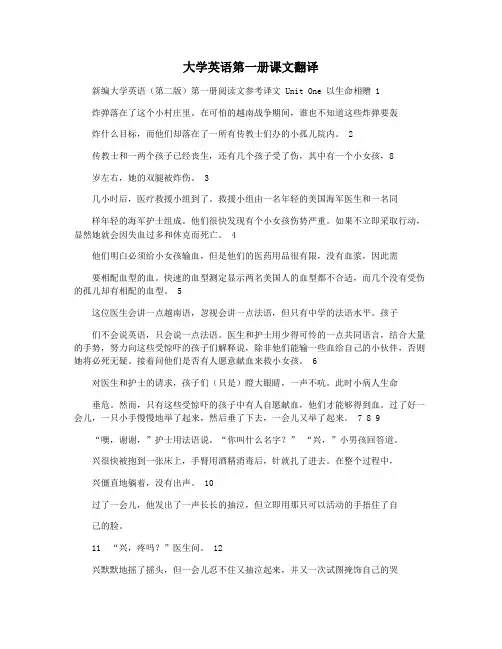
大学英语第一册课文翻译新编大学英语(第二版)第一册阅读文参考译文 Unit One 以生命相赠 1炸弹落在了这个小村庄里。
在可怕的越南战争期间,谁也不知道这些炸弹要轰炸什么目标,而他们却落在了一所有传教士们办的小孤儿院内。
2传教士和一两个孩子已经丧生,还有几个孩子受了伤,其中有一个小女孩,8岁左右,她的双腿被炸伤。
3几小时后,医疗救援小组到了。
救援小组由一名年轻的美国海军医生和一名同样年轻的海军护士组成。
他们很快发现有个小女孩伤势严重。
如果不立即采取行动,显然她就会因失血过多和休克而死亡。
4他们明白必须给小女孩输血,但是他们的医药用品很有限,没有血浆,因此需要相配血型的血。
快速的血型测定显示两名美国人的血型都不合适,而几个没有受伤的孤儿却有相配的血型。
5这位医生会讲一点越南语,忽视会讲一点法语,但只有中学的法语水平。
孩子们不会说英语,只会说一点法语。
医生和护士用少得可怜的一点共同语言,结合大量的手势,努力向这些受惊吓的孩子们解释说,除非他们能输一些血给自己的小伙伴,否则她将必死无疑。
接着问他们是否有人愿意献血来救小女孩。
6对医生和护士的请求,孩子们(只是)瞪大眼睛,一声不吭。
此时小病人生命垂危。
然而,只有这些受惊吓的孩子中有人自愿献血,他们才能够得到血。
过了好一会儿,一只小手慢慢地举了起来,然后垂了下去,一会儿又举了起来。
7 8 9“噢,谢谢,”护士用法语说。
“你叫什么名字?” “兴,”小男孩回答道。
兴很快被抱到一张床上,手臂用酒精消毒后,针就扎了进去。
在整个过程中,兴僵直地躺着,没有出声。
10过了一会儿,他发出了一声长长的抽泣,但立即用那只可以活动的手捂住了自己的脸。
11 “兴,疼吗?”医生问。
12兴默默地摇了摇头,但一会儿忍不住又抽泣起来,并又一次试图掩饰自己的哭声。
医生又问是不是插在手臂上的针弄疼了他,兴又摇了摇头。
13 但现在,偶尔的抽泣变成了持续无声的哭泣。
他紧紧地闭着眼睛,用拳头堵住嘴想竭力忍住哭泣。
大学英语第一册课后翻译Unit 11. When I knew the details I realized that I should not have lost my temper in the office.2. I don’t / didn’t know Bob very well, but we go / went out for an occasional drink together.3. The meeting is supposed to take place on Tuesday, but we have to postpone it / put it off.4. Our government took action to bring / get all the Chinese in that country back to China.5. Including weekends, there are only 12 more days to buy Christmas presents / gifts.6 .Without immediate action, many kinds / species of wild animals would die from hunger.Unit 31. You won’t get the job unless you’ve got the experience.2. I spent most of my time studying the differences betweenChinese and American cultures.3. The statement is so clear that it can’t cause any misunderstanding.4. He wishes he could give her more help than he does.5. Remember to invite her to the birthday party, or she would complain.6. “You have to add $2,500 for equipment purchase / buying equipment to the cost,” said the director.7. It is important to be aware of your strengths and weaknesses and the environment you are in.8. You will soon find yourself without any friends at all if you keep on being so rude to everybody.Unit 41 The individuals who have contributed are far too many / numerous to mention.2 The noise woke us up in the middle of the night.3 He shouldn’t have been angry at what I said. It was nothing more than a joke.4 We invited all our friends to the picnic, but it rained and only five of them showed up.5 Marriage is viewed as a serious matter.6 To my disappointment, the movie didn’t live up to my expectations.Unit 71.My friend said she would consider making a donation tothe school.2.I suggest he think carefully about it before he makes anydecisions.3.John is likely to come to the party tomorrow.4.It is not enough to have only theoretical knowledge. We shouldlearn how to put theory into practice.5.You shoul dn’t have gone back to the burning building- you mighthave been badly\seriously burned.6.It had never crossed my mind that there might be a problem.7.Charles is shy and does not take the initiative in making friends.Unit 81.Lengthy negotiations must take place before any agreement can bereached.2.A computer can store a great deal of information.3.By the age of 24, the young man had made himself CEO ofa largecompany.4.The teacher knows all his students by name.5.The police have finally succeeded in solving the mystery.6.He likes all kinds of sports, but most of all, basketball.7.He is eager to meet his favorite pop star face to face.8.They fell in love with each other because they had commoninterests.Unit 91.The topic of the speech was announced a week in advance, but thename of the speaker was not.2.It seemed incredible that some students played football just beforethe exams.3.Mr. Auden is a happy man, who derives pleasure from helpingothers.4.Most people are aware of/ have realized the need to reduce energyconsumption.5.First of all, you must have clear goals and then a practical/feasibleplan.6.I’m not accustomed to such luxury. It’s a waste of money.7.The results of the exam will be put up on Friday afternoon.8.Some cruel experiments on animals are carried out in thename ofscience.。
大学英语1课文及翻译大学英语1课文及翻译是我们需要的,大家一起看看下面的,欢迎各位阅读。
大学英语1课文及翻译Life Can Be CruelThere will be people in your life who won't be very nice. They'll tease you because you're different, or for no good reason. They might try to bully you or hurt you.There's not much you can do about these people except to learn to deal with them, and learn to choose friends who are kind to you, who actually care about you, who make you feel good about yourself. When you find friends like this, hold on to them, treasure them, spend time with them, be kind to them, love them.There will be times when you are met with disappointment instead of success. Life won't always turn out the way you want. This is just another thing you'll have to learn to deal with. But instead of letting these things get you down, push on. Accept disappointment and learn to persevere, to pursue your dreams despite pitfalls. Learn to turn negatives into positives, and you'll do much better in life.You will also face heartbreak and abandonment by those you love. I hope you don't have to face this too much, but it happens. Again, not much you can do but to heal, and to move on with your life. Let these pains become stepping stones to better things in life, and learn to use them to make you stronger.会很残酷你的生活中一定会有并不友好的人。
Unit1 A篇学无止境故事发生在一所东部大学里。
那是终考的最后一天。
一幢教学楼的台阶上围着一群大四的工科生,都在谈论即刻就要开始的考试。
他们脸上都带着自信。
这是毕业前的最后一场考试了,考完后,即是毕业典礼。
然后他们将各奔前程。
话题转到了工作上,有的谈起了找好的工作,有的则谈论着要找的工作。
4年的大学学习给了他们自信,使他们觉得自己足以征服世界。
眼前这场考试,不过是一碟小菜罢了。
老师已经说过可以携带所需的任何书本或笔记,只要不在考试时交头接耳就行了。
学生们兴高采烈地步入教室。
试卷发下来了。
看到只有5道论述题,他们一个个脸笑上开了花。
3小时过去后,老师开始收卷。
学生们先前的那份自信再也看不到了,而是满脸惊慌。
老师握着试卷,面对全班,大家都沉默不语。
她扫了一眼眼前这一张张不安的脸,问道:"5道题全答完的有多少?" 没人举手。
"做完4道的有多少?" 还是没人举手。
"3道呢?两道呢?" 学生们再也坐不住了。
"那么一道呢?总有做完一道的吧。
" 教室里依然鸦雀无声。
老师搁下试卷,说道:"这我早料到了。
""我只是想让你们牢牢记住,即使你们已经完成了4年工科学习,这个领域你们还有很多东西要学。
其实,你们答不出的这些问题在日常生活中很常见。
"她笑了笑,接着说,"这门课你们都能通过,但要记住,你们虽然已经大学毕业,但学习才刚刚开始。
"多年后,我已忘了这位老师的姓名,但牢牢记住了她的教诲。
B篇回眸大学4年的时光已经过去,这一刻终于来临了。
不到两周,我就要毕业了。
此刻回想起来,我仍不敢相信时光飞逝如斯。
我依然记得第一天去上课时的情景,我一边望着课表背面的地图,一边打听教学楼在哪儿。
现在我已是大四的学生,常会以羡慕的眼光看着一年级的新生。
每天我都祈愿时间会凝滞,接下来的两周过得更慢一些。
Unit 11.在生活中,我们最愚蠢的行为就是太执着于自己的东西,不愿意放弃。
(cling to sth. , let go )In life ,our stupidest course of action is to cling too much to what we have and refuse to let go .2.我愿意在IT行业工作,但我不知如何着手。
(go about sth.)I am willing to work in the IT industry , but have no idea how to go about it .3.许多人都已意识到与大自然和谐相处的重要性。
(aware of , in harmony with)Many people are aware of the importance of living in harmony with nature .4.像“代购”这样的问题是不可以被掩盖起来的。
(sweep…under the carpet )Problems like the generation gap cannot be swept under the carpet .5.我始终不懂什么事在使她心烦。
(eat away at )I never did understand what was eating away at her .6.他一生都与世无争。
(at peace with )He has been at peace with the world all his life .7.他没有说出自己的想法。
一则她未必理解,二则他怕自己得不到她的宽恕。
(for one thing …,for anothe r )He did not speak out /say what he thought .For one thing, she might not understand . For another ,he was afraid that she might not forgive him.8.随着岁月流逝,他对中国文化越来越感兴趣。
1.这个婴儿还不会爬(crawl),更不要说走了。
(let alone)The baby can't even crawl yet, let alone walk!2. 威尔声称谋杀案发生时他正在与一群朋友吃饭,但是我认为他在说谎。
(cl aim, in one's opinion)Will claimed he was dining with a group of friends when the murder happened, but in my opinion he told a lie.3. 一定程度上阅读速度与阅读技巧密切相关;有了阅读技巧,你就可以更好地应对课外阅读了。
(to a certain extent, relate …to …, cope with)To a certain extent the speed of reading is closely related to reading skills; and with reading skills you can cope with outside class reading better.4. 根据规则他俩都可以参加比赛。
(according to)According to the regulation/rule, they both can play the game/participate in the game.5.有些人想当然地认为日语(Japanese)中的每一个词在汉语中都有对应的词语。
(assume, equivalent)Some people assume that there is a Chinese equivalent for every Japanese word.6.我们已将所有的相关信息告知了警方。
(relevant)We have passed all relevant information on to the police.We have informed the police of all the relevant information.We have told the police all the relevant information.7 关于那件事你问我再多的问题也没用,因为我是不会回答你的。
大学大一英语教材翻译Translation of First-Year College English TextbookIntroduction:概述:As the first-year college English textbook, this material aims to provide a comprehensive foundation for students' English language skills. It covers various aspects of English, including grammar, vocabulary, reading comprehension, writing, and speaking. The textbook adopts a communicative approach and incorporates interactive activities to enhance students' English proficiency and understanding of Western culture. In this translation, we will discuss the key characteristics and contents of the textbook.I. Unit 1: Introduction to English Language and Culture第一单元:英语语言与文化概述Unit 1 introduces students to the English language and its cultural significance. It covers the history of English, its development, and its global spread. The unit explores the diversity of English-speaking countries and cultures, emphasizing the importance of cultural understanding in language learning. Students engage in vocabulary exercises, reading comprehension activities, and discussions to build a solid foundation of knowledge.II. Unit 2: Grammar Essentials第二单元:语法要点Unit 2 focuses on essential grammar skills necessary for effective communication. It covers topics such as tenses, sentence structure, parts of speech, and common grammatical errors. Through interactive exercises and practice, students learn how to construct grammatically correct sentences and express their ideas accurately. Additional resources, such as online quizzes and grammar reference materials, are provided to supplement students' learning.III. Unit 3: Vocabulary Expansion第三单元:词汇扩展Unit 3 aims to expand students' vocabulary bank by introducing them to a wide range of words and phrases. It incorporates various learning techniques, including word associations, context-based exercises, and word usage in different contexts. Students are encouraged to acquire new vocabulary through reading, listening, and speaking activities, enabling them to express themselves more effectively in English.IV. Unit 4: Reading Comprehension第四单元:阅读理解Unit 4 focuses on improving students' reading comprehension skills. It includes a variety of texts, such as articles, essays, and short stories, covering different genres and themes. Students learn how to analyze and understand the main ideas, supporting details, and implicit meanings in the texts. Furthermore, they are encouraged to engage in discussions and share their interpretations, promoting critical thinking and cultural awareness.V. Unit 5: Writing Skills第五单元:写作技巧Unit 5 aims to enhance students' writing skills in English. It covers various types of writing, such as descriptive essays, argumentative essays, and formal letters. Students learn how to structure their writing, develop coherent paragraphs, and use appropriate vocabulary and grammar. Through peer feedback and revision exercises, students improve their writing style, organization, and clarity of expression.VI. Unit 6: Speaking and Listening第六单元:口语与听力Unit 6 focuses on developing students' oral communication and listening skills. It includes engaging dialogues, role-plays, and group discussions to simulate real-life communication situations. Students practice expressing their opinions, giving presentations, and actively listening to others. Pronunciation exercises help students develop clear and accurate spoken English.Conclusion:结论:This translation provides an overview of the first-year college English textbook. It highlights the essential components and objectives of each unit, emphasizing the holistic approach adopted in teaching English language and culture. By following the textbook, students can expect to improve their language proficiency, critical thinking, and cross-cultural understanding.The translation aims to support educators and students in achieving their learning goals effectively.。
Unit 1 Writing for MyselfUseful Expressions1. 断断续续 off and on2. 对…感到腻味 be bored by ...3. 觉得…枯燥难懂 find ... dull and difficult4. 以…而出名have a reputation for ...5. 据说某人… sb. be said to be ...6. 拘谨刻板,落后于时代 formal, rigid and out-of-date7. 随笔小品文 an informal essay8. 躺在沙发上 lie on a sofa9. 不得不面对… face up to ...10. 围坐在晚餐桌旁 be seated around the supper table11. …重现在我脑海中 ... reawake in my mind12. 自得其乐for one’s own joy13. 违反规定 violate the rules14. 不及格分a failing grade15. 别无选择,只好做…There is no choice but t o do ...16. 更重要的是,而且what’s more17. 专心地听 listen attentively18. 乐呵呵地开怀大笑 laugh with open-hearted enjoyment19. 心花怒放pure delight20. 最后的时刻 at the eleventh hourSentence Translation1. The idea of becoming a writer had come to me off and on since my childhood in Belleville, but it wasn’t until my third year in high school that the possibility took hold.Paraphrasing: Ever since I was a child in Belleville, I had thought of becoming a writer from time to time, but I didn’t make up my mind until I was in the eleventh grade.从孩提时代,我还住在贝尔维尔时,我的脑子里就断断续续地转着当作家的念头,但直等到我高中三年级,这一想法才有了实现的可能。
2. Until then I’d been bored by everything associated with English courses.Paraphrasing: Up to then I had lost interest in things related to English courses.在这之前,我对所有跟英文课沾边的事都感到腻味。
3. I hated the assignments to turn out long, lifeless paragraphs that were agony for teachers to read and for me to write.Paraphrasing: I found it painful to write long, boring essays as required by teachers; neither did teachers enjoy what I wrote.我痛恨那些长而乏味的段落写作,老师读着受累,我写着痛苦。
4. When our class was assigned to Mr. Fleagle for third-year English I anticipated another cheerless year in that most tedious of subjects.Paraphrasing: When it was decided that Mr. Fleagle would teach us English during my third year in high school, I expected the English course to be as boring as before. 弗利格尔先生接我们的高三英文课时,我就准备着在这门最最单调乏味的课上再熬上沉闷的一年。
5. Mr. Fleagle had a reputation among students for dullness and inability to inspire.弗利格尔先生在学生中以其说话干巴和激励学生无术而出名。
6. Late in the year we tackled the informal essay.Paraphrasing: Late in the year we learned how to write informal essays and practiced writing them.后半学期我们学写随笔小品文。
7. None was quite so simple-minded as “What I Did on My Summer Vacation,” but most seemed to be almost as dull.像“暑假二三事”那样傻乎乎的题目倒是一个也没有,但绝大多数一样乏味。
8. Lying on the sofa, I finally faced up to the unwelcome task, took the list out of my notebook, and scanned it.我躺在沙发上,最终不得不面对这一讨厌的功课,便从笔记本里抽出作文题目单粗粗看了一下。
9. 我的目光落在“吃意大利细面条的艺术”这个题目上。
The topic on which my eye stopped was “The Art of Eating Spaghetti.”10. This title produced an extraordinary sequence of mental images. Paraphrasing: At the sight of the title I saw an unusual series of pictures in my mind’s eye.这个题目在我脑海里唤起了一连串不同寻常的图像。
11. 突然我就想描述那一切,描述当时那种温馨美好的气氛,但我把它写下来仅仅是想自得其乐,而不是为弗利格尔先生而写。
Suddenly I wanted to write about that, about the warmth and good feeling of it, but I wanted to put it down simply for my own joy, not for Mr. Fleagle.12. To write it as I wanted, however, would violate all the rules of formal composition I’d l earned in school, and Mr. Fleagle would surely give it a failing grade.照我希望的那样去写,就会违反我在学校里学的正式作文的种种法则,弗利格尔先生也肯定会打它一个不及格。
13. 等我写完时已是半夜时分,再没时间为弗利格尔先生写一篇循规蹈矩、像模像样的文章了。
When I finished it the night was half gone and there was no time left to compose a proper, respectable essay for Mr. Fleagle.14. I was preparing myself for a command to report to Mr. Fleagle immediately after school for discipline.Paraphrasing: I expected that Mr. Fleagle would order me to see him soon after school for the purpose of punishing me.我正准备着遵命一放学就去弗利格尔先生那儿挨训。
15. 我尽力不流露出得意的心情,但是看到我写的文章竟然能使别人大笑,我真是心花怒放。
I did my best to avoid showing pleasure, but what I was feeling was pure delight at this demonstration that my words had the power to make people laugh.16. In the eleventh grade, at the eleventh hour, as it were, I had discovered a calling.Paraphrasing: In my eleventh grade, and one might say at the last possible moment, I had found something I wished to take up as a career.就在十一年级,可谓是最后的时刻,我找到了一个今生想做的事。
Proverbs and Quotations1. Youth and age will never agree.少年和老头,永远不相投。
2. Youth is the season of hope.青春是希望的季节。
3. Youth must have its fling (猛冲).年轻人要敢闯。
4. You have to believe in yourself. That’s the secret of success.— Charles Chaplin, American actor人必须相信自己,这是成功的秘诀。
——美国演员 C. 卓别林5. Follow your own course, and let people talk.— Dante, Italian poet走自己的路,让人家去说吧。
——意大利诗人但丁Writing PracticeA Brief IntroductionA letter of congratulations, or congratulation letter, is used in both personal and business situations. Its primary purpose is to formally congratulate someone on an outstanding achievement. Certain types of congratulation letters are also referred to as “commendation letters” in some situations. In order to write an effective congratulation letter, you can follow the following tips:1. Write the congratulation letter as soon as possible after the fortunate event takes place.2. State in the beginning the specific occasion that has motivated you to write your letter.3. Express praise and approval of the reader’s accomplishments.4. Keep your congratulation letter simple and concise —under one page in length.5. Be positive and don’t include any negative comments or unhappy news.6. Don’t suggest that the fortunate event should benefit the letter-writer in any way.7. Don’t exaggerate your congratulatory words, or your letter may seem sarcastic or mocking.8. Edit your letter for correct structure, grammar, and punctuation.9. Don’t forget to spell check your letter.10. Wait some time and proof-read your letter again before sending it.Sample LettersInformalHi Moon,I am very glad to hear from you that you are getting married. Congratulations on your marriage.You are so lucky. You married a handsome and intelligent man. Anyway, I wish you happiness.By the way, since you are getting married, how are you going to plan your wedding? Is there a wedding ceremony or a wedding party? I think it would be romantic if the ceremony is held in a church. And where are you going to spend your honeymoon? I really hope to join your wedding ceremony. Congratulations again. How lovely to hear the good news.Yours sincerely,EdwardFormalJune 25, 2009Belinda Asher620 Mayview Ave.Pineville, WV 24874Dear Belinda:On behalf of everyone here at Deerwood Resorts Ltd., Iwould like to sincerely congratulate you on your recent graduation from Mountain State University with your M.B.A. (Marketing).I must say that I was not surprised to read of your success in the newspaper. During your first of four summers as an employee at our Lakeland Family Resort, I noted how bright and quick-minded you are for business. Combine those attributes with your relentless work ethic and commitment to quality customer service, and it is obvious that you have a wide-open future ahead of you.I can only hope that your experience working with us contributed in some small way to your success.On behalf of the management and staff at Deerwood Resorts, I wish you all the best in your future career and life endeavors, whatever they may be.Yours sincerely,Bruce AtkinsonPresident and CEOExerciseYou are required to write a letter of congratulations based on the information below.1. XX是你高中的同班同学。